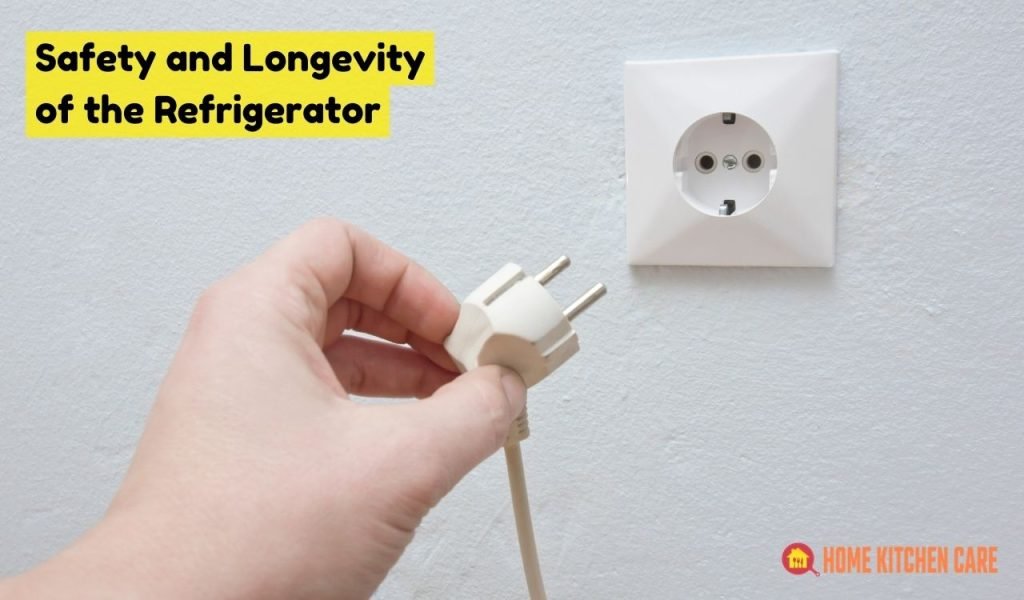Physical Address
304 North Cardinal St.
Dorchester Center, MA 02124
Physical Address
304 North Cardinal St.
Dorchester Center, MA 02124

Can you leave a refrigerator unplugged for a year?” It’s a question that might have crossed your mind at some point. Whether you’re planning an extended trip, moving, or have other reasons to consider this, you’re in the right place for answers. In the next few moments, we’ll delve into the factors, risks, and alternatives associated with keeping your fridge off the grid for an entire year.
So, if you’re curious about the fate of that trusty appliance and the impact on your food, energy bills, and the environment, read on. We’ve got you covered!
Main Summary: Can You Leave a Refrigerator Unplugged for a Year?
Leaving your refrigerator unplugged for a year can result in food spoilage, mold growth, and higher energy usage upon reconnection. To minimize risks, clean the appliance, adjust temperature settings, and consider alternatives.
The idea of leaving your refrigerator unplugged for an entire year might come up for various reasons – extended travel plans, moving to a new place, or temporary storage. However, before you decide to go ahead with it, there are several critical factors you should carefully consider.
Perhaps the most immediate concern is the fate of the food and perishable items inside your refrigerator. Refrigerators are designed to maintain a stable, low temperature, which is essential for preserving the freshness and safety of your food. Leaving a refrigerator unplugged for a year can have several significant consequences:
You might think that unplugging your refrigerator for an extended period will save you money on electricity bills. While this is true to some extent, the impact is more complex than it seems:
Before unplugging, clean and defrost the refrigerator. Ensure it’s securely closed to prevent accidental openings. Consider using odor absorbers to prevent unpleasant smells.
Even when unplugged, refrigerators require occasional checks. Look for leaks, mold growth, and other issues. Leave the door slightly ajar to prevent mold and mildew.
If concerned about the appliance’s long-term health, consult a technician before unplugging. Higher-quality refrigerators may fare better during extended storage. Alternatively, consider alternative storage solutions to avoid unplugging your primary refrigerator.
Unplugging your refrigerator for a year is not a decision to be taken lightly. It affects food safety, energy efficiency, and the appliance’s overall well-being. Adequate preparation, maintenance, and consideration of alternatives are essential to ensure a smooth process and preserve your resources effectively.

The idea of leaving your refrigerator unplugged for an entire year may arise due to various circumstances, such as extended travel plans, moving, or temporary storage. While it’s possible to do so, it’s crucial to follow specific steps to ensure the safety of your appliance and prevent potential issues. Here’s a guide on how to properly unplug your refrigerator for an extended period.
Before we delve into the steps, let’s clarify the scenario. Refrigerators are designed to maintain a consistent, low temperature to preserve the freshness of your food. Unplugging a refrigerator for an extended period disrupts this functionality, and certain precautions must be taken.
If your refrigerator has a freezer, defrost it completely. This prevents the buildup of ice and frost during the unplugged period.
To keep the interior smelling fresh, consider placing odor absorbers or deodorizers inside the refrigerator. This helps prevent unpleasant odors from developing.
Cover the exterior of the refrigerator with a cloth or plastic sheet to shield it from dust and debris. This minimizes the cleaning required when you plug it back in.
If you have concerns about leaving your refrigerator unplugged for an extended period, consider consulting a technician or appliance expert. They can provide guidance specific to your appliance’s make and model.
When the time comes to plug your refrigerator back in:
Leaving your refrigerator unplugged for a year is feasible if you follow the proper steps to prepare, secure, and maintain the appliance. Adequate cleaning, defrosting, and periodic checks are essential to ensure that it operates efficiently and safely when you plug it back in.
If you have any doubts or concerns, it’s advisable to seek professional guidance to preserve the longevity of your refrigerator and prevent potential issues. By taking these precautions, you can confidently unplug your refrigerator for an extended period without compromising its functionality.
When you decide to leave your refrigerator unplugged for an extended period, proper maintenance is essential to ensure that the appliance remains in good condition and to prevent potential issues when you eventually plug it back in. Here are the key maintenance steps to take during the unplugged period:
Regular inspections of your unplugged refrigerator are crucial to detect and address any emerging issues. Consider performing these checks every few weeks:
Preventing the growth of mold and mildew is critical during the unplugged period. Here’s how to keep these issues at bay:
Protecting your refrigerator from dust and debris is essential to maintain its cleanliness and prevent damage. Consider these measures:
Pest infestations can be a concern when leaving a refrigerator unplugged. To avoid attracting pests:
Maintaining records of your checks and observations can be valuable. Create a log with dates of inspections, any issues encountered, and the actions taken to address them. This documentation can help you stay organized and identify any patterns or recurring problems.
Proper maintenance during the unplugged period is essential to ensure that your refrigerator remains in good condition and to prevent potential issues. Regular checks, mold prevention, dust protection, pest control, and record keeping are all important aspects of refrigerator maintenance during extended storage. By following these steps, you can increase the likelihood that your refrigerator will function smoothly when you eventually decide to plug it back in.

When leaving your refrigerator unplugged for an extended period, it’s essential to consider both the safety of the appliance and its long-term durability. Proper care and precautions can help ensure that your refrigerator remains in good condition and continues to function effectively when you decide to reconnect it. Here are some key aspects to consider:
Before unplugging your refrigerator for an extended period, it’s advisable to consult a technician or appliance expert. They can provide valuable insights and recommendations specific to your appliance’s make and model. A professional can:
A technician’s expertise can help you make informed decisions and ensure the safety and longevity of your refrigerator.
The overall quality and construction of your refrigerator can significantly influence its ability to withstand being unplugged for an extended period. High-quality refrigerators often have better insulation, temperature control, and durability. If you have concerns about leaving your refrigerator unplugged, consider the following:
Rather than leaving your primary refrigerator unplugged, consider alternative storage solutions for your food items:
When the time comes to plug your refrigerator back in, certain precautions can help ensure a smooth restart:
Considering the safety and longevity of your refrigerator when leaving it unplugged for an extended period is essential. Consulting a technician, assessing the appliance’s quality, exploring alternative storage solutions, and preparing for reconnection are all vital steps to ensure the appliance’s well-being.
By taking these precautions and seeking professional guidance when needed, you can confidently manage the unplugged period while preserving the safety and functionality of your refrigerator.
After an extended period of being unplugged, the process of reconnecting and restarting your refrigerator requires careful attention to ensure that it operates effectively and safely. Here’s a step-by-step guide on how to bring your refrigerator back to life:
Before plugging in your refrigerator, conduct a thorough inspection of both the interior and exterior:
Ensure that the power source where you intend to plug in the refrigerator is stable and provides the correct voltage. Refrigerators are sensitive to voltage fluctuations, so it’s crucial to have a stable power supply to prevent damage.
Adjust the temperature settings to your preferred levels:
Once you’ve plugged in the refrigerator and adjusted the temperature settings, closely monitor its operation during the initial restart:
Once the refrigerator has stabilized and is operating correctly, you can begin restocking it with food and items. When doing so:
To ensure the continued optimal operation of your refrigerator, schedule regular maintenance checks, including:
By following these steps and conducting regular maintenance, you can successfully reconnect and restart your refrigerator after an extended unplugged period. Proper care and attention will help ensure the appliance’s longevity and the safety of the food stored inside.

Unplugging your refrigerator for an extended period may seem necessary at times, but there are viable alternatives to consider that can help you avoid potential issues. Here are some alternatives to leaving your refrigerator unplugged:
If you’re planning to be away for an extended vacation or temporary move, consider adjusting the temperature settings of your refrigerator:
Before your absence, empty your refrigerator of perishable items that may spoil during your time away. Use or donate items that may expire soon. Then, clean the refrigerator thoroughly to prevent odors and mold growth:
Instead of unplugging the entire refrigerator, consider unplugging specific components:
Install a timer or use a smart plug to control when your refrigerator runs. This allows you to set specific intervals for the refrigerator to operate, reducing its energy consumption while keeping it running intermittently to maintain temperature.
If you have access to a secondary refrigerator, consider transferring essential items to that unit before your extended absence. Leave your primary refrigerator running with reduced contents or unplugged as needed.
For longer absences or moves, consider renting a climate-controlled storage unit. These units are designed to maintain optimal temperature and humidity levels, ensuring your belongings, including perishable items, remain in good condition.
Consult with a refrigerator technician or appliance expert for guidance on how to reduce energy consumption and ensure the appliance’s safety during your absence. They can provide specific recommendations tailored to your situation.
By exploring these alternatives, you can make informed decisions about how to handle your refrigerator during extended periods of non-use while minimizing potential risks and preserving the appliance’s longevity.
Leaving a refrigerator unplugged for a year is a decision that should be made with careful consideration of the potential consequences. While it may be necessary in certain situations, it comes with risks to the appliance, the contents, and even the environment.
Proper preparation, maintenance, and thoughtful alternatives can help mitigate these risks and ensure a safe and efficient restart when the time comes. Ultimately, the choice to unplug your refrigerator for an extended period should be based on a thorough assessment of your unique circumstances and needs.
A refrigerator can stay unplugged for a few hours without any significant issues. However, for longer periods, it’s best to take precautions such as emptying and cleaning it to prevent mold and odors.
When a refrigerator is not used for an extended period, it can lead to mold growth, foul odors, and potential food spoilage. It’s important to properly clean and prepare the appliance for storage.
It’s generally not necessary to unplug a refrigerator when not in use, especially for short periods. Modern refrigerators are designed to be energy-efficient, and unplugging may lead to food spoilage and wasted energy.
Unplugging a refrigerator for short periods is usually fine. However, extended unplugging can result in issues like food spoilage, mold growth, and increased energy consumption when plugged back in.
Leaving a refrigerator unplugged for an extended period can lead to potential issues such as mold, odors, and energy inefficiency. Proper cleaning and preparation can minimize these risks.
A refrigerator can generally be restarted after being unplugged for years, but it may require thorough cleaning and maintenance to ensure safe and efficient operation. Consulting a technician is advisable in such cases.
Leaving an empty fridge unplugged for a short period is generally fine, as long as it’s clean and dry. For extended periods, consider keeping the door ajar to prevent mold and odors.
Leaving the fridge door open when unplugged can help prevent mold and odors by allowing air circulation. However, it’s best for short periods, and for longer durations, empty and clean the fridge before leaving it slightly ajar.